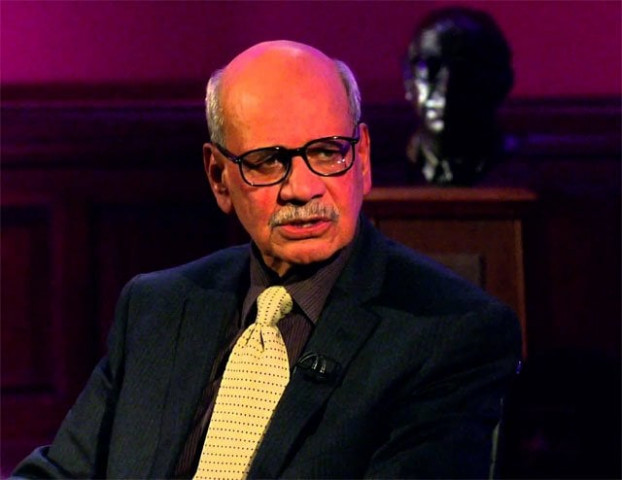The Spy Chronicles: ruminations of former ISI, RAW chiefs
Ex-ISI chief reveals downplaying an earlier exposé to avoid attracting audience to its notorious content

Former ISI chief says the book he co-authored with ex-RAW chief AS Dulat is just an expression of perspectives. YOUTUBE SCREENGRAB @ALJAZEERA
Former ISI chief Asad Durrani’s new book titled The Spy Chronicles: RAW, ISI and the Illusion of Peace, co-authored with former RAW chief Amarjit Singh Dulat and journalist Aditya Sinha, may not be explosive in the traditional sense, because many of the ‘revelations’ have been the stuff of coffee table discussions for years.
The difference is that this time the words are coming straight from the mouth of a former spy chief.
GHQ summons ex-ISI chief over 'Spy Chronicles'
Ominously, he also speaks that his words were taken out of context when he responded to Muhammad Yusaf’s ‘The Bear Trap’, which highlighted the exploits of his predecessor Gen (retd) Hamid Gul.
“When it [the book] was published, I think during my period, someone came [to me] and said: ‘Look at what’s written. What should we do? Should we get a hold of the man? Or court martial him? Or issue a rebuttal? I said: ‘There must be 20 people who have read the book, but once we do something, 200 people will read it. I’m not happy with things that are projected out of context or send a message that might not be helpful either to the country or to the organisation.”
At one point, Durrani boasted that none of ISI “operators ever defected or was caught on camera”.
Dulat agrees with him, saying: “Our biggest failure against Pakistan is that we’ve not been able to turn around an ISI officer or have an ISI officer working for us.”
Recounting ISI’s biggest failures against India, Durrani says: “At the operational level, [during] the 1965 war, we could claim we got good information about the other side, how they are assembled for war. But it was a lost effort. In the 1971 war, the ISI was unable to anticipate the attack in East Pakistan. In my time, we predicted that India’s military build-up after the Kashmir uprising was not intended for war. I can pat my own back for that. But the biggest failure was when the Kashmir uprising happened, we did not know how far it would go.”
Former top sleuth defends 'Spy Chronicles'
On influencing the media, Durrani says that ISI and RAW both “finance TV channels in the belief that these will work for them...Once a media organisation establishes credibility, the agencies start on core objectives: micro-managing, choreographing, managing from behind the scenes, steering the type of coverage, etc. My country on this front has not been impressive.”
He also criticised the lack of subtlety in manipulating the media. “An article was once published under either a Hindu or Sikh name in The Nation, Lahore. I saw that this could not have been written by anyone other than an ISI officer. The man who was given to publish it did not even change the terminology to Indianise it.”
Regarding a comment by Dulat that the Kashmir status quo suited Pakistan because of the violence, he wrote he did not comprehend the reasoning or go into its depth until after the turmoil hit the region after Burhan Wani’s killing.
“Then I started toying with the idea that because of what is happening in the Valley, Pakistan should simply sit back and ‘watch the fun’. Perhaps India would be forced to change its original policy, its old threats, its old approaches. And then we might have a new status quo. One could say that at this point of time, the status quo is not unfavourable to Pakistan. Pakistan could be comfortable with the unrest except that Kashmiris died. Also, if it inevitably goes on and even if you want no part in it, there would be fallout on this side of the Line of Control.”
On Bin Laden, he noted: “For Pakistan, being blamed for incompetence was more acceptable than complicity”.
If politicians co-authored a book with Indians, they would be charged with treason: Rabbani
On a possible deal made by the government or then army chief Ashfaq Kayani, he says: Kayani “was my favourite student at the NDC. Professionally sound. Though retired, he is keeping away from me lest I ask if he made a deal. I don’t think there is any reason for him, or for [Gen] Pasha who was heading the ISI at that time, for keeping quiet. Get the secret out because we’ve been getting the worst of both worlds. We are blamed for incompetence, for playing a double game; and what did we get in return? That is what I want to know.”
He also hints at rumours of a direct deal. “If Kayani settled for some farms or a billion dollars then I myself will start a campaign against him, who I once liked and feel was one of our thinking chiefs.”
But for many hawks, the most eye-catching comment the general makes may have to do with an EU-like South Asian Confederation. “...At some stage we can think of a common currency, or laws applicable to when we develop the new South Asian Union: a Confederation of South Asia. We can do it at least as well as the Europeans have...This is thinking aloud, we might reach a common minimum consensus. Maybe we’re not ready for such a big project but we can work on its elements, by softening the India-Pakistan borders, as in Kashmir, and make them irrelevant over time. Then five or ten years later, we’ll look at the next step. Delhi as the capital of a Union. Armed forces integrated. Reduction of forces numbers by ratio. In a hundred years, most of the demands of an Akhand Bharat may have been met. The reason one should discuss this is to not rule out any possibility.”



















COMMENTS
Comments are moderated and generally will be posted if they are on-topic and not abusive.
For more information, please see our Comments FAQ